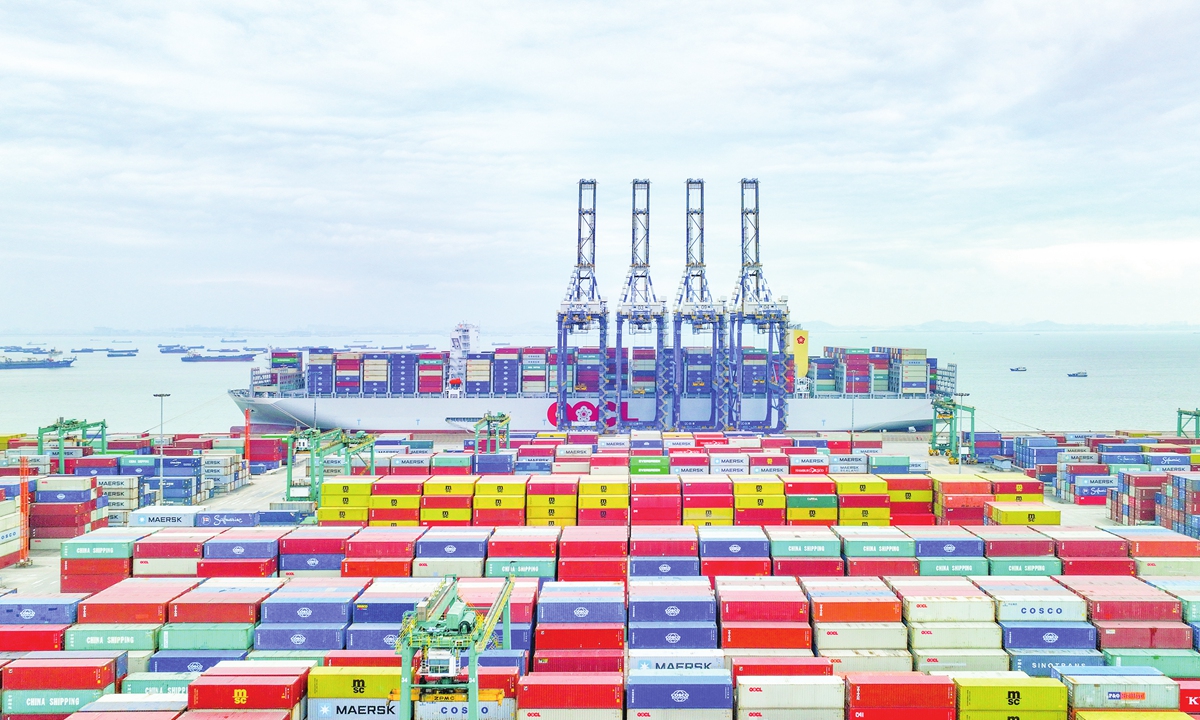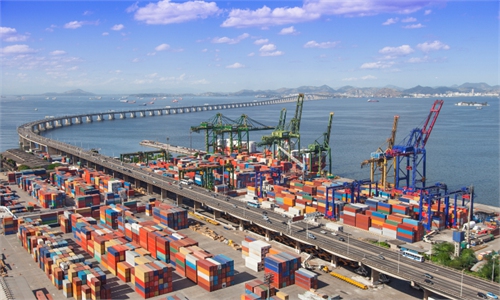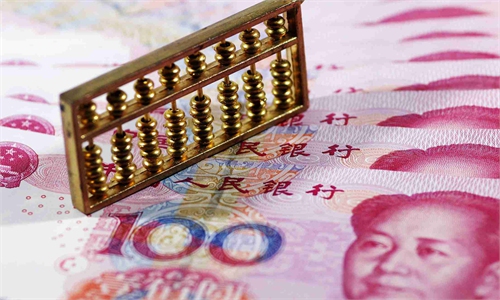China moves to further boost trade, will better deal with 'unreasonable' foreign restrictions
External environment remains uncertain, impacting trend: expert

A container terminal at the Port of Guangzhou in Nansha district File Photo: Courtesy of the Port of Guangzhou
China's State Council, the cabinet, on Tuesday announced a set of measures aimed at further stabilizing the country's foreign trade, including increasing financial support for the trade sector, expanding settlement in the yuan and better dealing with "unreasonable" foreign trade restrictions.
The move comes as China saw better-than-expected trade in the first quarter of 2023 but continues to face growing downward pressure on the major GDP growth driver, amid a complex and severe external environment marked by a global economic downturn and rising trade tensions.
In a notice released on Tuesday, the General Office of the State Council listed 18 specific measures as part of enhanced efforts to "promote the scale and optimized structure of foreign trade, so as to ensure the completion of the goal of stabilizing imports and exports and improving quality."
China will increase financial support for the trade sector, including better use of central fiscal policy, increased credit and insurance support and optimized cross-border settlement services, according to the notice.
Specifically, China will encourage financial institutions to innovate and improve foreign exchange derivatives and cross-border yuan business, further expand the scale of yuan settlement for cross-border trade, and meet the needs of trade companies for exchange rate hedging and cross-border yuan settlement.
"This package of trade stabilization measures is comprehensive, which will help the country overcome shortcomings in foreign trade, tackle pain points in the foreign trade situation such as sluggish external demand, and ensure long-term sustainable development," Bai Ming, a research fellow at the Chinese Academy of International Trade and Economic Cooperation in Beijing, told the Global Times on Tuesday.
Bai said that while China's trade saw a rebound in March, this is no time to take things lightly, as the overall trade is facing pressure from weakening external demand in Western economies, which means follow-up measures are necessary.
In March, China's exports recorded a surprisingly impressive growth rate of 14.8 percent year-on-year in dollar-denominated terms, reversing a declining trend that lasted for several months. However, despite the rosy figure, officials have warned of a "complex and severe" environment for China's foreign trade.
"China's foreign trade achieved a 'head start' in the first quarter. But we must acknowledge that China's foreign trade situation is complicated and severe, as it is confronted by multiple difficulties," Chinese Vice Minister of Commerce Wang Shouwen said on Sunday.
Yang Haiping, an economist with Bank of Inner Mongolia, said that the downward pressure on China's foreign trade is coming from the US-led push for economic decoupling and supply chain disruptions.
"The introduction of these measures is very timely, and the foreign trade pressure can be hedged through effective foreign trade stabilization policies and their joint effects," Yang told the Global Times on Tuesday.
Notably, the State Council's notice on Tuesday specifically called for better dealing with "unreasonable foreign trade restrictive measures." Specific efforts in this regard include support for major enterprises that have been affected, improved warning systems and legal services, and local public services to help enterprises.
In a bid to stabilize and expand the trade scale of major products, the notice specifically listed vehicles as a main export item to support. Among other measures, Chinese banks and their foreign subsidiaries are encouraged to offer financial support for automakers to explore overseas market.
While China's car exports have been surging rapidly, there are hurdles to overcome, industry analysts said. Zhang Zhanhao, operational director of COSCO Shipping Car Carriers, a leading car shipping company in China, told the Global Times that it is imperative to strive for self-reliance in ocean-going transport vessels and develop a global presence in the world's ports to ensure the smooth flow of automobile exports, one of China's fastest-growing export categories.
The State Council notice on Tuesday also called for efforts to improve logistics efficiency and ensure efficient and smooth transportation of commodities.



